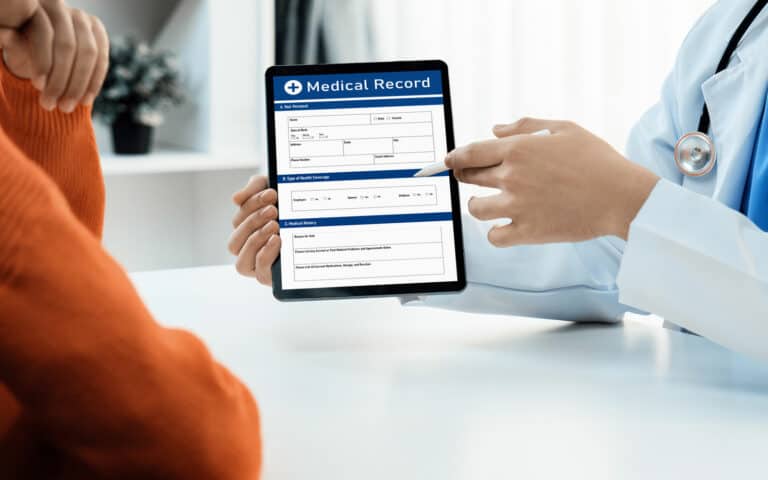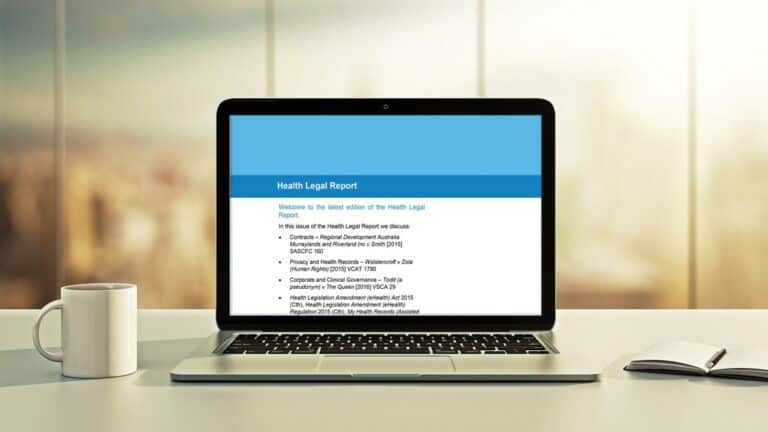This article applies to mental health and wellbeing service providers.
Mental Health and Wellbeing Bill 2022 (Vic)
Please be advised that the Mental Health and Wellbeing Bill 2022 (Vic) passed the Victorian Parliament on 30 August 2022 and received Royal Assent on 6 September 2022. Significantly, the Bill repeals the Mental Health Act 2014 (Vic). The Bill also makes consequential amendments to the Child Wellbeing and Safety Act 2005 (Vic), the Children, Youth and Families Act 2005 (Vic) and the Health Services Act 1988 (Vic) among others. The Bill will commence when proclaimed, or 1 September 2023 if not proclaimed earlier.
Background
In its final report, submitted in March 2021, the Royal Commission into Victoria’s Mental Health System recommended that new legislation be introduced to reset the legislative framework of Victoria’s mental health and wellbeing system. In line with this recommendation, the Bill reflects the future of the treatment and understanding of mental health in Victoria, including a new framework for supported decision-making and recovery-oriented practice.
The Bill sets up the new system in Victoria, creates the framework and establishes the necessary powers to ensure that new entities and existing stakeholders can operate effectively in the new scheme.
Subscribers should note that, although the Bill contains several important departures from the Mental Health Act 2014 (Vic), compulsory treatment provisions remain largely unchanged. Compulsory treatment, including the assessment and treatment criteria, will be the subject of a future independent review to consider changes in that space. The functions of the Chief Psychiatrist and Mental Health Tribunal are also retained in the Bill, to be revisited when the new Act is reviewed in 5-7 years.
Mental health and wellbeing service providers
The Bill contains a number of obligations on mental health and wellbeing service providers in relation to service provision, information sharing and oversight. Under section 3 of the Bill, these providers are entities that:
- receive funding from the State to provide a mental health and wellbeing service but does not include an entity, or a class of entity, that is prescribed not to be a mental health and wellbeing service provider; and
- employ or engage a mental health and wellbeing professional for the purposes of providing the mental health and wellbeing service.
For these purposes, a mental health and wellbeing service is defined as a professional service:
- performed for the primary purpose of:
- improving or supporting a person’s mental health and wellbeing;
- assessing, or providing treatment, care or support to, a person for mental illness or psychological distress; or
- providing care or support to a person who is a family member, carer, or supporter of a person with mental illness or psychological distress; or
- that is prescribed to be a mental health and wellbeing service;
but does not include:
- a non-legal mental health advocacy service; or
- a prescribed professional service.
Additionally, a mental health and wellbeing professional is a person who performs duties in connection with the provision of mental health and wellbeing services and is any of the following:
- a registered medical practitioner;
- a registered psychologist;
- a registered nurse or enrolled nurse;
- a registered paramedic;
- a registered occupational therapist;
- a social worker of a prescribed class;
- a counsellor of a prescribed class;
- a person employed or engaged in a prescribed role that requires the person to have personal experience with mental illness or experience as a carer of a person who is living with mental illness;
- a psychosocial support worker of a prescribed class; or
- an allied health professional of a prescribed class.
The categories of these providers extend beyond the scope of those captured by the old Act, and include providers of community-based treatment and those providing wellbeing services. However, a provider will only fall under the definition of a mental health and wellbeing service provider to the extent that it is providing a mental health and wellbeing service.
The Framework
The Bill and new framework for the treatment and support of mental health and wellbeing, focus heavily on the dignity and autonomy of people living with mental illness or psychological distress. As such, the Bill is underpinned by the human rights of such individuals and supported decision-making. Entities established and service providers captured by the Bill will be required to adhere to the obligations contained in the Charter of Human Rights and Responsibilities Act 2006 (Vic). Further, the Bill establishes a number of new principles with which providers must make all reasonable efforts to comply, as well as give proper consideration to the principles outlined. These principles are categorised as:
- the mental health and wellbeing principles;
- the decision-making principles for treatment and interventions; and
- the information sharing principles.
Compliance will be monitored state-wide by the newly established Mental Health and Wellbeing Commission (the Commission). The Commission is an independent body reporting to Parliament that will include people with lived experience of mental illness or psychological distress and those with lived experience as a family member, carer or supporter. The powers of the existing Mental Health Complaints Commissioner will be transferred to the Commission, and the Commission will also be given powers to support the mental health and wellbeing system, including powers of investigation at the Commission’s own initiative. The Commission will report any issues of non-compliance directly to Parliament, as well as to the Health Secretary, where issues pose a serious risk of harm to a person or the community.
In support of the Commission, the Bill establishes the legislative grounds for the creation of regional mental health and wellbeing boards to strengthen the delivery and governance of mental health and wellbeing services in regional areas.
The Bill creates the role of the Chief Officer for Mental Health and Wellbeing within the Department of Health (the Chief Officer), reporting to the Health Secretary, to elevate mental health and wellbeing within the Department. In addition, a new entity, Youth Mental Health and Wellbeing Victoria, is established to partner with specific providers dealing with Victorian youth, to ‘champion’ the voice of young people in this space.
Mental Health and Wellbeing Commission
Under Part 9.4 of the Bill, the Commission is granted powers of investigation at its own initiative, as well as the power to conduct follow-up investigations to monitor compliance. This is in addition to the Commission’s power to conduct an investigation in response to a complaint. The Commission may also issue compliance notices and accept undertakings by service providers to take remedial action in relation to a matter that is the subject of an investigation. Under section 483, a mental health and wellbeing service provider who receives an investigation report must give a written response to the Commission that includes the information outlined in that section, such as stating action that has been taken to implement any recommendations, and reasoning as to why a recommendation has not been implemented, if applicable.
Where a follow-up investigation is conducted by the Commission, the subject service provider must also provide a written response to any report given, containing the information described in section 489. Failure to give a written response to a report given by the Commission within the required time and without a reasonable excuse, can incur a penalty of, in the case of a natural person, 60 penalty units (currently $11,095.20), and in the case of a body corporate, 300 penalty units (currently $55,476).
It is also an offence to fail to comply with an investigation notice. This can result in a fine of 120 penalty units (currently $22,190.40), or 12 months imprisonment or both, in the case of a natural person, and a fine of 600 penalty units (currently $110,952), in the case of a body corporate.
Non-legal mental health advocacy services
To reflect the importance of non-legal mental health advocacy and the work done by advocates, Part 2.3 of the Bill enshrines the powers of these services and advocates within the Victorian mental health and wellbeing system. Mental health advocates have the power to access personal and health information relevant to their client held by mental health and wellbeing providers, attend meetings and seek information from providers’ staff, among other powers provided by section 47. As such, mental health and wellbeing services have new obligations in relation to this advocacy work.
In accordance with section 49, a service provider must give any reasonable assistance to any mental health advocate to enable the advocate to carry out their functions and perform their responsibilities with respect to a consumer. The Chief Officer will also develop protocols outlining service provider responsibilities regarding the process and form of notifications to a non-legal mental health advocacy service by a service provider. Pursuant to section 43 of the Bill, any notification required to be made to the advocacy service must be made in accordance with the non-legal advocacy protocols for mental health and wellbeing service providers.
The Mental Health and Wellbeing Principles
The mental health and wellbeing principles are set out in Part 1.5 of the Bill. These principles include, for example:
- the dignity and autonomy principle (section 16): The rights, dignity and autonomy of a person living with mental illness or psychological distress is to be promoted and protected and the person is to be supported to exercise those rights;
- the diversity of care principle (section 17): A person living with mental illness or psychological distress is to be provided with access to a diverse mix of care and support services. This is to be determined, as much as possible, by the needs and preferences of the person living with mental illness or psychological distress including their accessibility requirements, relationships, living situation, any experience of trauma, level of education, financial circumstances and employment status; and
- the family and carers principle (section 20): Families, carers and supporters (including children) of a person receiving mental health and wellbeing services are to be supported in their role in decisions about the person’s assessment, treatment and recovery.
In accordance with section 29 of the Bill, a service provider must make all reasonable efforts to comply with the mental health and wellbeing principles and give proper consideration to the principles when making a decision under the Act. A service provider is also required to provide safe, person-centred mental health and wellbeing services and foster continuous improvement in the quality and safety of the care and services they provide.
Pursuant to section 30 of the Bill, service providers must prepare an annual report that includes information about actions taken during the reporting period that relate to giving effect to one or more of the mental health and wellbeing principles.
Finally, under section 31, a person (who is authorised under the Act to give or disclose personal or health information) must not, if they reasonably believe that a person may be subjected to family violence or other serious harm as a result, give or disclose that information to another person. This section applies regardless of whether a person has consented to the disclosure of their personal or health information.
Informed consent
Importantly, the Bill sets out a process for obtaining informed consent for treatment of mental illness, aiming to give clarity to service providers. This process will apply any time a service provider seeks informed consent to treatment. Section 85 retains the presumption that a person has the capacity to give informed consent. Section 86 also gives detailed indicators of when a person may give informed consent, including the criteria for when a person has been provided with adequate information and reasonable opportunity to make a decision.
In accordance with section 87(1), a person has capacity where they:
- are able to understand the information they are given for the purpose of deciding whether or not to consent;
- are able to remember that information;
- are able to use or weigh that information in deciding whether or not to consent; and
- are able to communicate the decision the person makes by speech, gestures or any other means.
Additionally, subsections 87(2) and (3) provide the factors that must be considered when determining whether a person has the capacity to give informed consent, and the reasonable steps that must be taken by the person carrying out the assessment to ensure that the assessment is carried out so that any decision is accurate and the person being assessed is appropriately supported to give informed consent.
Authorised persons
Chapter 5 of the Bill reflects Recommendation 10 of the Royal Commission which recommended that responses to mental health emergencies be more heavily driven by health professionals rather than police. This is given voice in section 228 of the Bill, which requires that the powers under Chapter 5 are to be exercised by an authorised health professional as far as reasonably practicable, or if not practicable, are to be informed by or on the advice of an authorised health professional. As defined in section 231 of the Bill, an authorised health professional means a registered paramedic employed by an ambulance service, a registered medical practitioner employed or engaged by a designated mental health service, an authorised mental health practitioner, or a member of a prescribed class of person. Authorised persons are also required to give proper consideration to the mental health and wellbeing principles.
Under Part 5.7, there are a number of provisions that apply generally to authorised persons. Under section 252, certain information must be provided when taking a person into care and control. This information includes, but is not limited to, the identity of the authorised person, an explanation of why the authorised person is taking them into care and control and details of any designated mental health service or other place to which they are being transported, if those details are available.
Mental health crisis response
Section 232 of the Bill now allows for a person to be taken into care and control (previously described as ‘apprehended’ in the Mental Health Act 2014 (Vic)) by not only police and protective services officers but by registered paramedics employed by an ambulance service or a member of a prescribed class, if the authorised person is satisfied that the person appears to have a mental illness and it is necessary to take the person into care and control to prevent imminent and serious harm to that person or another person. The authorised person must then arrange for the person in their care and control to be examined as soon as practicable or may, at any time, transfer the person into the care and control of another authorised person, if necessary, to arrange for the examination.
The abovementioned authorised persons also have the power to enter premises for the purposes of taking a person into care and control. The authorised person must, in accordance with section 246, announce to any person at or in the premises that they are authorised to enter, state the basis for entry, and give any person at or in the premises an opportunity to permit them to enter. If not permitted to enter, the authorised person may use reasonable force to enter.
Transport
Any authorised person may take a person into care and control for the purposes of transporting the person to or from a designated mental health service. The authorised person is then responsible for transporting or arranging the transport of the person by another authorised person, as soon as practicable. Otherwise, the authorised person must transfer care and control to another authorised person who then assumes those responsibilities. Any transfer of care and control must also be arranged as soon as is practicable. Under section 244, on transporting a person to or from a designated mental health service, the person must be accepted into the care and control of a registered medical practitioner, an authorised mental health practitioner or a registered nurse.
Search, seize and secure
While a person is in the care of an authorised person under Parts 5.2 or 5.3, the authorised person may search the person if the authorised person reasonably suspects that the person is carrying anything that presents a danger to health and safety. The authorised person must, to a reasonable extent, explain to the person the purpose of the search. There is also an obligation that the authorised person informs the person being searched whether they are required to remove any clothing and if so, why it is necessary. Further obligations under section 248 include, but are not limited to, that the authorised person asks for the co-operation of the person being searched, and that the search is conducted in a way that provides reasonable privacy for the person being searched and as quickly as reasonably practicable. Searches on a person under the age of 16 are also required to be conducted in the presence of a parent, carer or supporter, or another adult (if not practicable for a parent, carer or supporter to be present).
Youth mental health and wellbeing services
Under section 714, the newly established Youth Mental Health and Wellbeing Victoria (YMHWV) may collect any health or personal information, identifiers and unique identifiers about an individual from mental health and wellbeing service providers, public service bodies, public entities, Victoria Police, prescribed bodies under the Victorian Data Sharing Act 2017 (Vic) or a court or tribunal, to the extent necessary to perform its functions.
A mental health and wellbeing service provider providing youth mental health and wellbeing services under an agreement with YMHWV must disclose any information relating to the provision of those services in accordance with any written direction from YMHWV. Failure to provide the required information can result in a penalty of 60 penalty units (currently $11,095.20), in the case of a natural person, and 300 penalty units in the case of a body corporate (currently $55,476). Those providing youth mental health and wellbeing services under an agreement may also be audited on the authorisation of YMHWV.
Declared operators
Certain mental health and wellbeing service providers may be declared a “declared operator” for the purposes of providing youth mental health and wellbeing services under a service agreement with YMHWV. Declared operators may be a designated mental health service, or another mental health and wellbeing service provider that meets any prescribed requirements. These declarations may also specify an area in which the declared operator may provide youth mental health and wellbeing services and impose any restrictions the Minister considers appropriate. Subscribers should also note that, for the purposes of the Bill, a declared operator under section 704(2) is taken to be a designated mental health service. This imposed status as a designated mental health service ends if the entity ceases to be a declared operator.
Under section 706, a service agreement with YMHWV may require a declared operator to carry out a number of functions including providing youth mental health services across community, specialist and inpatient services (both voluntary and compulsory) within a specified area and to undertake research into the design, delivery and evaluation of youth mental health and wellbeing services. The YMHWV Board and a declared operator must prepare a statement of priorities for each financial year that is consistent with the YMHWV statement of priorities. Any proposed statement must satisfy the requirement of section 707(3) and specify:
- the services to be provided under the service agreement between Youth Mental Health and Wellbeing Victoria and the declared operator and the funds to be provided to the declared operator under the agreement;
- the objectives, priorities and key performance outcomes to be met by the declared operator; and
- the performance indicators, targets or other measures against which the performance of the declared operator is to be assessed and monitored.
Information sharing
In accordance with the Royal Commission’s recommendations, Chapter 17 of the Bill aims to provide clarity around information disclosure and sharing with a view to emphasising consent and involving families, carers and supporters. To that end, the Bill introduces information sharing principles in Part 17.1. An entity that makes a decision or exercises a power related to the disclosure, use or collection of health information or personal information under the Act must give proper consideration to the information sharing principles. These principles include:
- the dignity of person paramount principle (section 723): Mental health and wellbeing service providers are to uphold the dignity of a person including by ensuring that the person’s health information or personal information are recorded accurately and respectfully; and
- the accuracy of information principle (section 726): Reasonable steps are to be taken to ensure that any information relating to a person receiving mental health and wellbeing services that is recorded or shared is accurate, relevant and up to date.
The Bill refers to the yet-to-be-established electronic health information system that will maintain the records of a person who receives mental health and wellbeing services from a designated mental health service or prescribed mental health and wellbeing service provider, and enable access to, and sharing of, information between persons authorised or permitted to access and share information under the Act. Information may be entered into this system by a person who is employed or engaged by a mental health and wellbeing service provider or a prescribed emergency service provider. This system is expected to be operational by 2026. It is an offence to use or disclose health information system information without authorisation. This offence can result in a penalty of 60 penalty units (currently $11,095.20) in the case of a natural person, and 300 penalty units in the case of a body corporate (currently $55,476). The same penalty will apply where the electronic system is used in an unauthorised manner, as well as when information is damaged, destroyed or removed from the electronic system without authorisation.
Under section 730, health information must not be disclosed without the person’s consent. An unauthorised disclosure can result in a fine of 60 penalty units (currently $11,095.20), unless an exemption under section 730(2) applies.
Disclosures may also be made by service providers at key points of care with the person’s consent. These key points are admission to a bed-based service, before discharge from a bed-based service and following the performance of a task or function specified by the Health Secretary in a published notice on the Department’s website. The service provider must disclose the health information to a person’s family, carer or supporter in accordance with the consent unless section 732 applies (which outlines the situations in which a provider may refuse to disclose despite consent).
Additionally, information may be shared between mental health and wellbeing service providers and specified service providers if reasonably necessary to assist in the transfer of a person between service providers or ensure integrated services are provided to the person. The mental health and wellbeing service provider must inform the person receiving services from them that they may disclose personal or health information unless the person elects otherwise. Where a person makes such an election, the service provider must keep a written record of that election. Disclosure may also be made to emergency services to facilitate provision of emergency services or while performing a function under the Act.
Please click here to access the full Bill.




